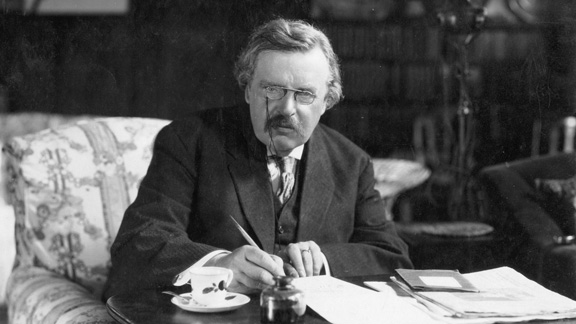Published in 1905, the following essay shows the prophetic abilities of G.K. Chesterton in describing what has now come to full fruition. Read carefully and thoughtfully, asking how it applies to today’s family.
On Certain Modern Writers and the Institution of the Family, by G.K. Chesterton
The family may fairly be considered, one would think, an ultimate human institution. Everyone would admit that it has been the main cell and central unit of almost all societies hitherto, except, indeed, such societies as that of Lacedaemon, which went in for “efficiency,” and has, therefore, perished, and left not a trace behind…. But some sages of our own decadence have made a serious attack on the family. They have impugned it, as I think wrongly; and its defenders have defended it, and defended it wrongly. The common defense of the family is that, amid the stress and fickleness of life, it is peaceful, pleasant, and at one. But there is another defense of the family which is possible, and to me evident; this defense is that the family is not peaceful and not pleasant and not at one.
It is not fashionable to say much nowadays of the advantages of the small community. We are told that we must go in for large empires and large ideas. There is one advantage, however, in the small state, the city, or the village, which only the willfully blind can overlook. The man who lives in a small community lives in a much larger world. He knows much more of the fierce varieties and uncompromising divergences of men. The reason is obvious. In a large community we can choose our companions. In a small community our companions are chosen for us. Thus in all extensive and highly civilized societies groups come into existence founded upon what is called sympathy, and shut out the real world more sharply than the gates of a monastery. There is nothing really narrow about the clan; the thing which is really narrow is the clique. The men of the clan live together because they all wear the same tartan or are all descended from the same sacred cow; but in their souls, by the divine luck of things, there will always be more colors than in any tartan. But the men of the clique live together because they have the same kind of soul, and their narrowness is a narrowness of spiritual coherence and contentment, like that which exists in hell. A big society exists in order to form cliques. A big society is a society for the promotion of narrowness. It is a machinery for the purpose of guarding the solitary and sensitive individual from all experience of the bitter and bracing human compromises. It is, in the most literal sense of the words, a society for the prevention of Christian knowledge.
We can see this change, for instance, in the modern transformation of the thing called a club. When London was smaller, and the parts of London more self-contained and parochial, the club was what it still is in villages, the opposite of what it is now in great cities. Then the club was valued as a place where a man could be sociable. Now the club is valued as a place where a man can be unsociable. The more the enlargement and elaboration of our civilization goes on the more the club ceases to be a place where a man can have a noisy argument, and becomes more and more a place where a man can have what is somewhat fantastically called a quiet chop. Its aim is to make a man comfortable, and to make a man comfortable is to make him the opposite of sociable. Sociability, like all good things, is full of discomforts, dangers, and renunciations….
We make our friends; we make our enemies; but God makes our next-door neighbor. Hence he comes to us clad in all the careless terrors of nature; he is as strange as the stars, as reckless and indifferent as the rain. He is Man, the most terrible of the beasts. That is why the old religions and the old scriptural language showed so sharp a wisdom when they spoke, not of one’s duty towards humanity, but one’s duty towards one’s neighbor. The duty towards humanity may often take the form of some choice which is personal or even pleasurable. That duty may be a hobby; it may even be a dissipation. We may work in the East End because we are peculiarly fitted to work in the East End, or because we think we are; we may fight for the cause of international peace because we are very fond of fighting. The most monstrous martyrdom, the most repulsive experience, may be the result of choice or a kind of taste. We may be so made as to be particularly fond of lunatics or specially interested in leprosy. We may love Negroes because they are black or German Socialists because they are pedantic. But we have to love our neighbor because he is there– a much more alarming reason for a much more serious operation. He is the sample of humanity which is actually given us. Precisely because he may be anybody he is everybody. He is a symbol because he is an accident….
Now, exactly as this principle applies to the empire, to the nation within the empire, to the city within the nation, to the street within the city, so it applies to the home within the street. The institution of the family is to be commended for precisely the same reasons that the institution of the nation, or the institution of the city, are in this matter to be commended. It is a good thing for a man to live in a family for the same reason that it is a good thing for a man to be besieged in a city. It is a good thing for a man to live in a family in the same sense that it is a beautiful and delightful thing for a man to be snowed up in a street. They all force him to realize that life is not a thing from outside, but a thing from inside. Above all, they all insist upon the fact that life, if it be a truly stimulating and fascinating life, is a thing which, of its nature, exists in spite of ourselves. The modern writers who have suggested, in a more or less open manner, that the family is a bad institution, have generally confined themselves to suggesting, with much sharpness, bitterness, or pathos, that perhaps the family is not always very congenial. Of course the family is a good institution because it is uncongenial. It is wholesome precisely because it contains so many divergencies and varieties. It is, as the sentimentalists say, like a little kingdom, and, like most other little kingdoms, is generally in a state of something resembling anarchy. It is exactly because our brother George is not interested in our religious difficulties, but is interested in the Trocadero Restaurant, that the family has some of the bracing qualities of the commonwealth. It is precisely because our uncle Henry does not approve of the theatrical ambitions of our sister Sarah that the family is like humanity. The men and women who, for good reasons and bad, revolt against the family, are, for good reasons and bad, simply revolting against mankind. Aunt Elizabeth is unreasonable, like mankind. Papa is excitable, like mankind. Our youngest brother is mischievous, like mankind. Grandpapa is stupid, like the world; he is old, like the world.
Those who wish, rightly or wrongly, to step out of all this, do definitely wish to step into a narrower world. They are dismayed and terrified by the largeness and variety of the family. Sarah wishes to find a world wholly consisting of private theatricals; George wishes to think the Trocadero a cosmos. I do not say, for a moment, that the flight to this narrower life may not be the right thing for the individual, any more than I say the same thing about flight into a monastery. But I do say that anything is bad and artificial which tends to make these people succumb to the strange delusion that they are stepping into a world which is actually larger and more varied than their own. The best way that a man could test his readiness to encounter the common variety of mankind would be to climb down a chimney into any house at random, and get on as well as possible with the people inside. And that is essentially what each one of us did on the day that he was born.
This is, indeed, the sublime and special romance of the family. It is romantic because it is a toss-up. It is romantic because it is everything that its enemies call it. It is romantic because it is arbitrary. It is romantic because it is there. So long as you have groups of men chosen rationally, you have some special or sectarian atmosphere. It is when you have groups of men chosen irrationally that you have men. The element of adventure begins to exist; for an adventure is, by its nature, a thing that comes to us. It is a thing that chooses us, not a thing that we choose. Falling in love has been often regarded as the supreme adventure, the supreme romantic accident. In so much as there is in it something outside ourselves, something of a sort of merry fatalism, this is very true. Love does take us and transfigure and torture us. It does break our hearts with an unbearable beauty, like the unbearable beauty of music. But in so far as we have certainly something to do with the matter; in so far as we are in some sense prepared to fall in love and in some sense jump into it; in so far as we do to some extent choose and to some extent even judge–in all this falling in love is not truly romantic, is not truly adventurous at all. In this degree the supreme adventure is not falling in love. The supreme adventure is being born. There we do walk suddenly into a splendid and startling trap. There we do see something of which we have not dreamed before. Our father and mother do lie in wait for us and leap out on us, like brigands from a bush. Our uncle is a surprise. Our aunt is, in the beautiful common expression, a bolt from the blue. When we step into the family, by the act of being born, we do step into a world which is incalculable, into a world which has its own strange laws, into a world which could do without us, into a world that we have not made. In other words, when we step into the family we step into a fairy-tale….
The thing which keeps life romantic and full of fiery possibilities is the existence of these great plain limitations which force all of us to meet the things we do not like or do not expect. It is vain for the supercilious moderns to talk of being in uncongenial surroundings. To be in a romance is to be in uncongenial surroundings. To be born into this earth is to be born into uncongenial surroundings, hence to be born into a romance. Of all these great limitations and frameworks which fashion and create the poetry and variety of life, the family is the most definite and important. Hence it is misunderstood by the moderns, who imagine that romance would exist most perfectly in a complete state of what they call liberty. They think that if a man makes a gesture it would be a startling and romantic matter that the sun should fall from the sky. But the startling and romantic thing about the sun is that it does not fall from the sky. They are seeking under every shape and form a world where there are no limitations–that is, a world where there are no outlines; that is, a world where there are no shapes. There is nothing baser than that infinity. They say they wish to be, as strong as the universe, but they really wish the whole universe as weak as themselves.






